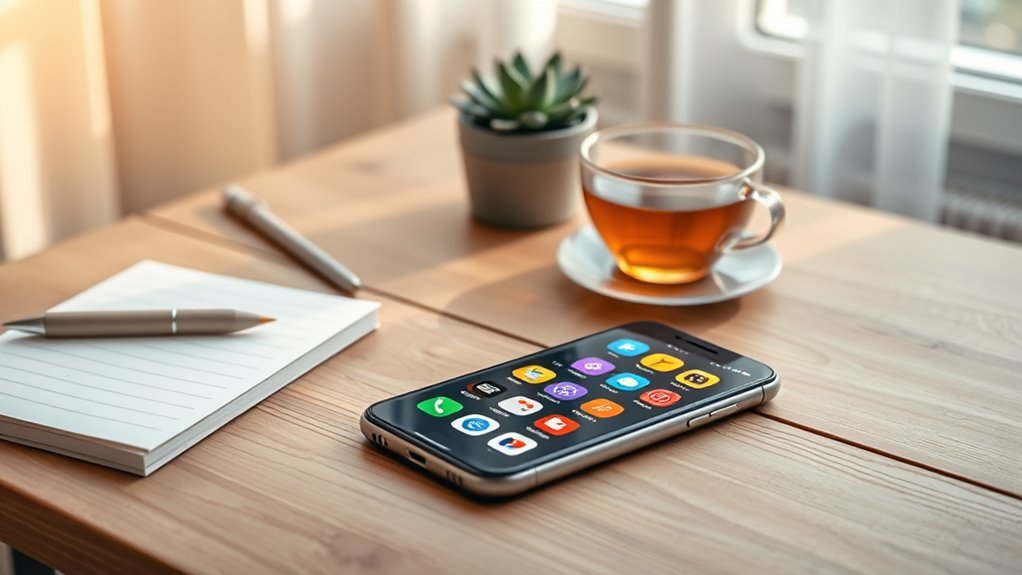Mental health apps can be helpful in managing emotions, reducing anxiety, and promoting resilience if you use them consistently and choose quality options. They offer tools like mindfulness exercises, mood tracking, and self-monitoring that support your mental well-being. However, they work best when combined with traditional strategies and professional guidance. Keep in mind their limits and privacy considerations. To fully understand how to maximize their benefits, explore the details ahead.
Key Takeaways
- Mental health apps can help reduce anxiety and depression symptoms but their effectiveness depends on consistent use and app quality.
- They serve as supportive tools, complement traditional therapy, and should not replace professional guidance.
- Features like mood tracking, mindfulness exercises, and personalized content enhance their usefulness.
- Responsible use involves customizing settings, maintaining privacy, and integrating app routines into broader mental health strategies.
- Future developments aim for more personalized, AI-driven interventions and better integration with wearable health devices.
Understanding the Role of Mental Health Apps in Well-Being

Have you ever wondered how mental health apps influence your overall well-being? These apps can be powerful tools for improving emotion regulation, helping you manage stress and difficult feelings more effectively. By offering guided exercises, mindfulness practices, and self-monitoring features, they enable you to better understand and control your emotional responses. Additionally, mental health apps contribute to stigma reduction by providing a private, accessible space to seek support without fear of judgment. This anonymity encourages more people to address mental health concerns proactively. As a result, you may feel more empowered to take charge of your mental health, fostering resilience and a sense of balance. Furthermore, the integration of diverse psychological techniques in these apps enhances their effectiveness in supporting mental wellness. The use of evidence-based practices ensures that users receive scientifically supported interventions, increasing their likelihood of positive outcomes. Incorporating technology-driven methods also facilitates personalized approaches to mental health management, making support more tailored and effective. Recognizing the importance of user engagement strategies can help sustain motivation and commitment to mental health routines. Overall, these apps play a crucial role in supporting emotional stability and breaking down barriers around mental health.
How Effective Are Mental Health Apps? Evidence and Insights
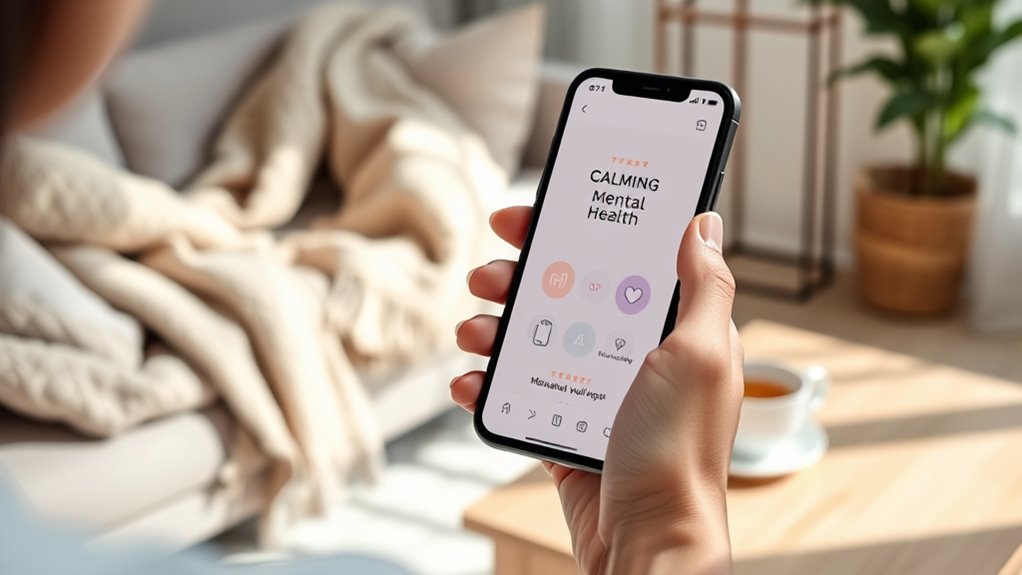
Are mental health apps truly effective in improving emotional well-being? Efficacy studies show mixed results but generally indicate that many apps can help reduce symptoms of anxiety and depression. You might notice improvements if you consistently practice the exercises and strategies offered. User satisfaction varies, with some users reporting significant benefits, while others find limited value. The success often depends on the app’s quality, your engagement level, and your specific needs. While research supports the potential of mental health apps, they shouldn’t replace professional care when needed. Instead, they can serve as valuable tools to supplement therapy or self-help efforts. Overall, the evidence suggests that mental health apps can be effective, but their impact depends on individual use and app features.
Key Features to Look for in a Mental Health App
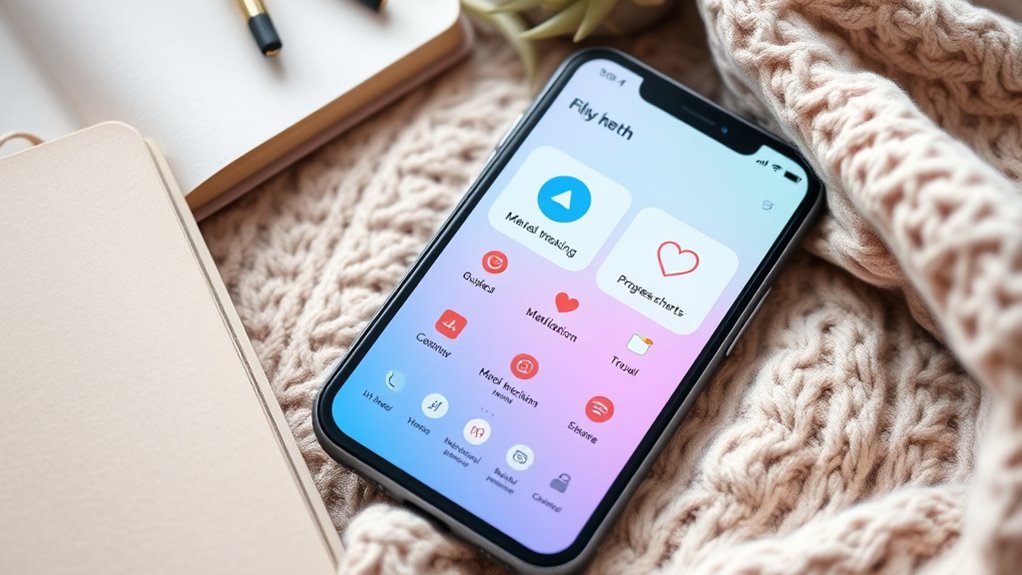
When choosing a mental health app, focusing on key features can make a significant difference in its effectiveness and suitability for your needs. Look for tools that promote emotional intelligence and stress management, helping you understand and regulate your feelings. An intuitive interface, personalized content, and progress tracking can enhance your experience. Guarantee the app offers evidence-based techniques, such as mindfulness exercises or cognitive behavioral strategies. Compatibility with your devices and privacy protections are also essential. Additionally, safety features ensure your data remains confidential and secure. Incorporating creative practice elements, like journaling prompts or expressive exercises, can further support emotional well-being. Exploring essential oils for mental health, such as lavender for calming or peppermint for focus, might complement your overall mental wellness routine. Considering the availability of dog-related content, such as pet therapy or stress relief activities involving dogs, could also be beneficial for some users. Incorporating research-backed methods into your routine can help maximize the benefits of mental health apps.
Common Types of Mental Health Apps and Their Benefits
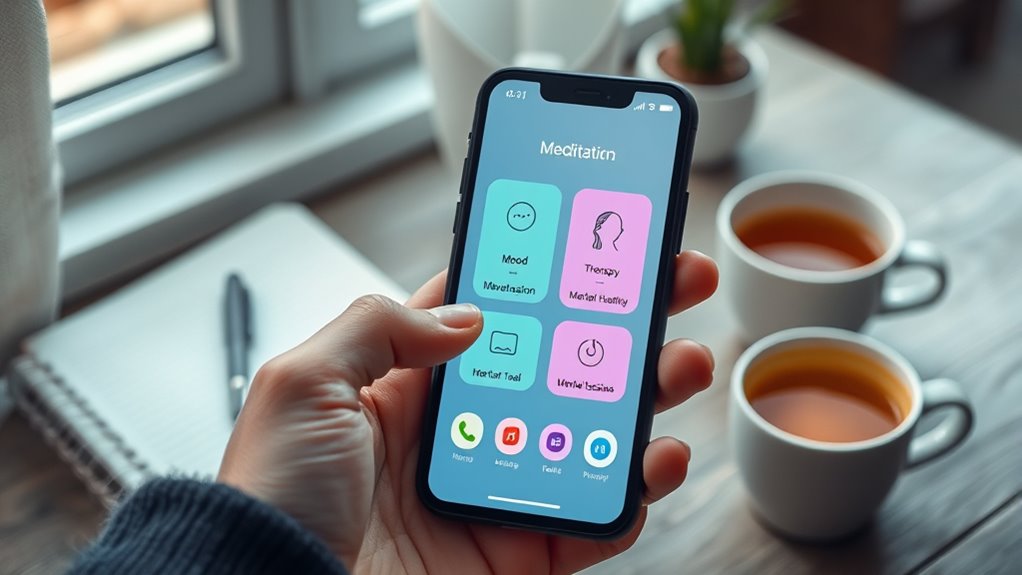
There are several common types of mental health apps, each designed to address specific needs and offer targeted benefits. For example, mindfulness apps focus on mindfulness exercises, helping you reduce stress and improve emotional regulation through guided meditation and breathing techniques. Mood tracking apps allow you to monitor your emotional patterns over time, giving you valuable insights into triggers and progress. Some apps combine these features, offering an all-encompassing approach to mental wellness. By regularly practicing mindfulness exercises, you can develop healthier coping strategies, while mood tracking helps identify patterns and early warning signs of issues. These apps empower you to take control of your mental health daily, making self-care more accessible and personalized. Additionally, understanding the effectiveness of mental health apps can help you choose the right tools for your needs, especially considering the importance of evidence-based approaches in mental health support. Advances in digital health interventions continue to improve the reliability and scope of these tools, ensuring they are increasingly integrated into comprehensive mental health strategies. For instance, ongoing research into app efficacy is vital for validating their role in supporting mental wellness, particularly as many of these tools leverage technological innovations to enhance user engagement.
Limitations and Risks of Relying on Digital Tools
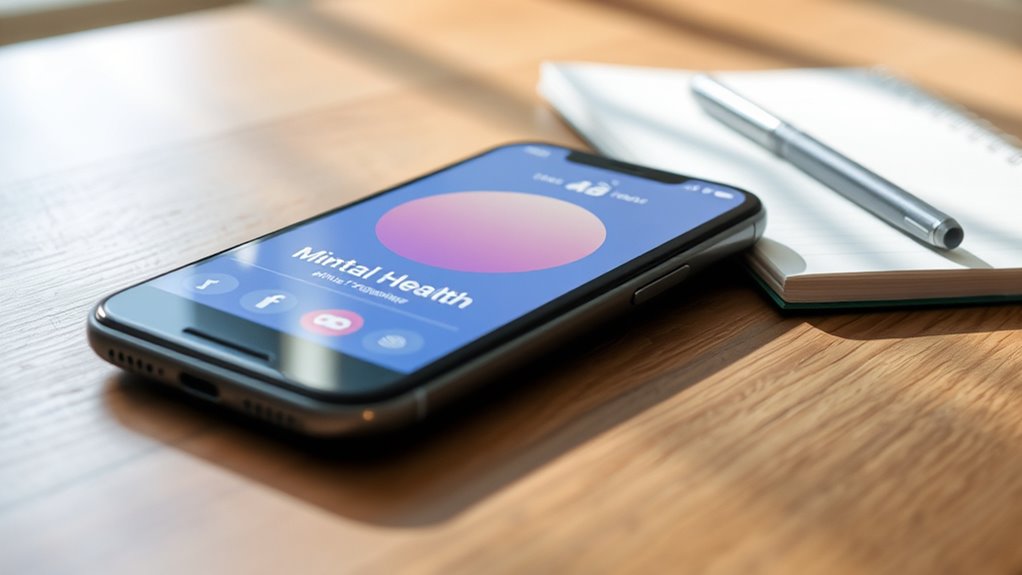
While mental health apps can be helpful, they also come with risks you should consider. Privacy concerns and data security issues may expose your personal information, and overreliance could lead to neglecting professional care. It’s important to understand these limitations before depending solely on digital tools for support. Additionally, awareness of cookie categories and how they track your interactions can help you make informed decisions about your online privacy. Recognizing patterns of behavior, such as reliance on apps instead of seeking professional guidance, can prevent potential setbacks in your mental health journey.
Privacy Concerns and Data Security
Despite the convenience of mental health apps, relying on digital tools raises significant privacy concerns and data security risks. Your sensitive information could be vulnerable if not properly protected. Here are key issues to contemplate:
- Data encryption: Ensure the app uses strong encryption to protect your data during transmission and storage.
- User anonymity: Check if the app allows you to remain anonymous, reducing the risk of personal data exposure.
- Data sharing policies: Review how your data is shared or sold, and whether third parties have access.
While these features can enhance privacy, no system is completely foolproof. Be cautious about the information you share and stay informed about the app’s security practices to safeguard your mental health data.
Overdependence and Self-Management
Have you considered that relying heavily on mental health apps can lead to overdependence, potentially undermining your ability to manage challenges independently? Digital dependency might make you feel secure, but it can also weaken your self-reliance over time. If you depend solely on apps for coping strategies, you risk losing touch with your innate resilience and problem-solving skills. While these tools can support you, they shouldn’t replace personal effort or real-world interactions. Over time, this reliance may hinder your growth and adaptability, making it harder to handle setbacks without digital assistance. To maintain a healthy balance, use mental health apps as supplementary resources rather than primary solutions, ensuring your self-management skills stay strong and your independence intact.
Tips for Maximizing the Benefits of Mental Health Apps
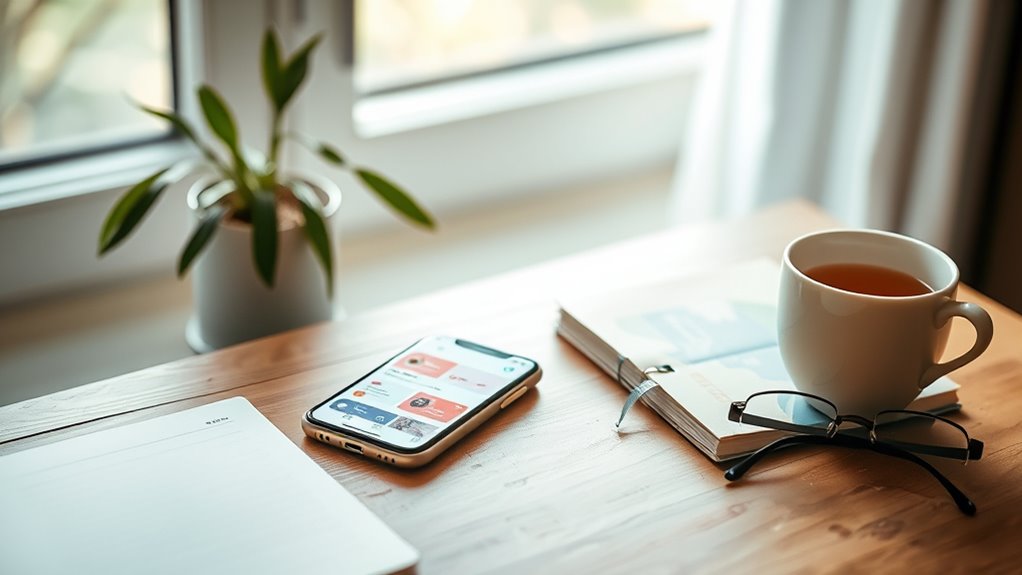
To get the most out of mental health apps, you need to use them intentionally and consistently. First, set aside dedicated time daily for mindfulness exercises; this helps you stay grounded and develop healthier habits. Second, regularly use emotional tracking features to monitor your mood patterns; this awareness can reveal triggers and progress. Third, customize your app experience—adjust notifications and select activities that resonate with you—to keep engagement high. Fourth, be aware of resources and tools available to support your mental health journey, which can enhance your understanding and effectiveness. Incorporating evidence-based practices into your routine can further improve your results. Staying informed about mental health research can help you choose the most effective apps and strategies. Additionally, understanding the role of special occasions in mental health can aid in celebrating milestones and maintaining motivation. Consistency is key: the more you use the app thoughtfully, the more benefits you’ll see. Remember, mental health apps are tools to support your journey, so stay committed and mindful of how you incorporate them into your daily routine.
Integrating Apps Into Your Overall Mental Health Strategy
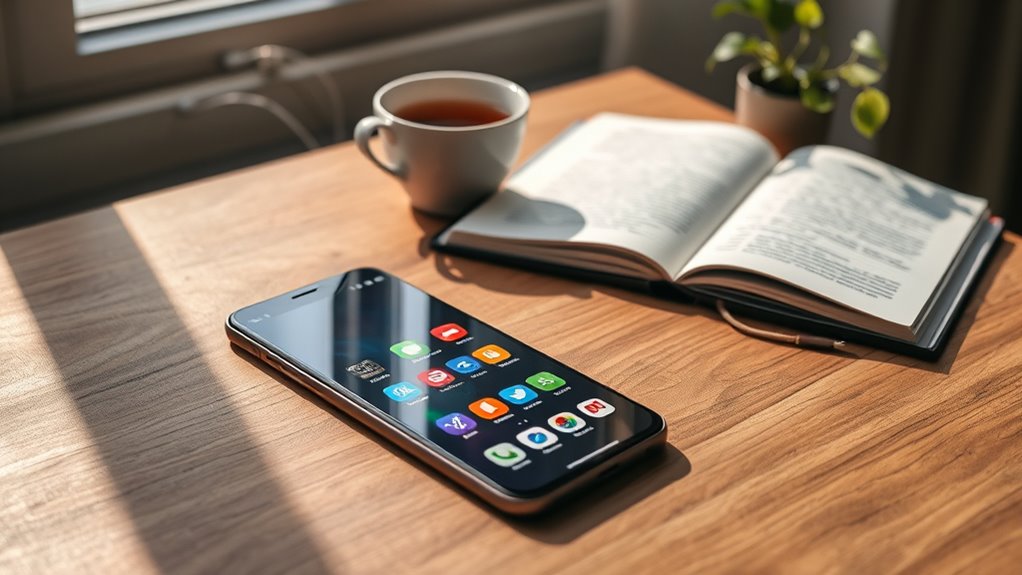
Integrating mental health apps into your overall strategy involves viewing them as complementary tools rather than standalone solutions. You can enhance your well-being by combining app-based support with traditional therapeutic techniques, such as mindfulness or cognitive-behavioral strategies. To do this effectively, focus on app integration—using apps to reinforce skills learned in therapy or daily routines. For example, if your therapist emphasizes journaling or breathing exercises, find apps that support these practices and incorporate them into your daily schedule. Remember, apps are designed to supplement your mental health plan, not replace professional guidance. By thoughtfully weaving app use into your broader approach, you can create a more cohesive, flexible, and sustainable mental health strategy tailored to your needs. Additionally, selecting user-friendly designs can help ensure consistent usage and maximize benefits. Incorporating apps that are easy to navigate can also reduce frustration and improve adherence over time, especially when they are compatible with your existing device preferences and lifestyle.
Personalization and Privacy Considerations
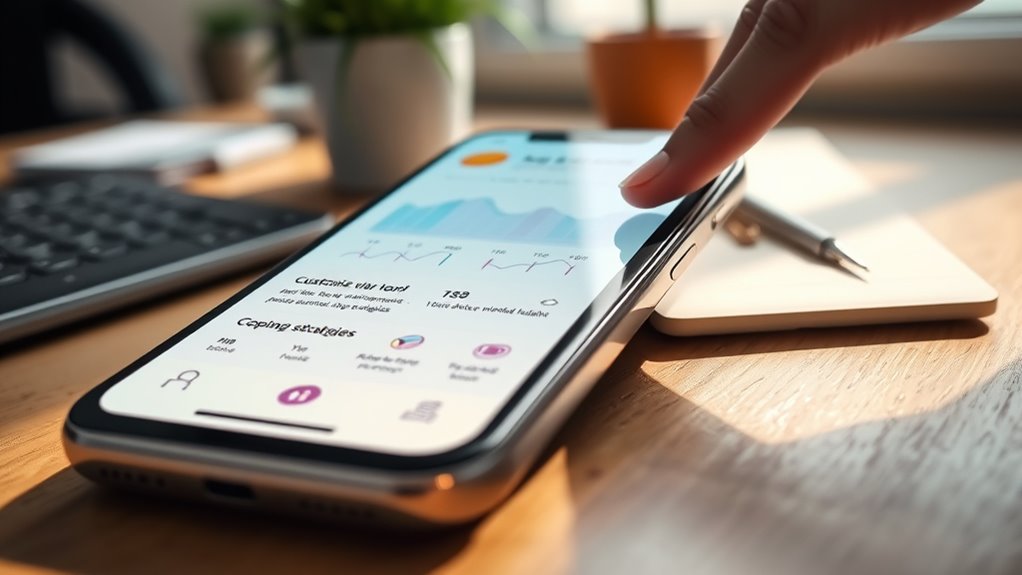
When choosing a mental health app, you should consider how much control you have over customization options to tailor it to your needs. It’s also important to evaluate the security measures in place to protect your personal data. Being aware of these factors helps guarantee your privacy is maintained while getting the most personalized support.
Customization Options and Control
Many mental health apps offer a range of customization options that allow you to tailor your experience to your needs. These customization options give you control mechanisms over features like notifications, content focus, and session length. For example, you can:
- Adjust reminder frequencies to fit your schedule.
- Select specific themes or topics that resonate with your goals.
- Set privacy preferences for data sharing and visibility.
Data Security Measures
While customization options let you personalize your mental health app experience, safeguarding your sensitive data remains a top priority. Reputable apps use robust encryption protocols to protect your information both during transmission and storage, reducing the risk of breaches. They also emphasize user anonymity, allowing you to access features without revealing your identity if you choose. Look for apps that clearly explain their privacy policies and security measures. Avoid platforms that share your data with third parties or lack transparent encryption practices. By prioritizing these data security measures, you ensure your mental health journey stays confidential. Remember, your privacy is essential, and choosing apps with strong encryption and a commitment to user anonymity helps you maintain control over your personal information.
Success Stories and User Experiences
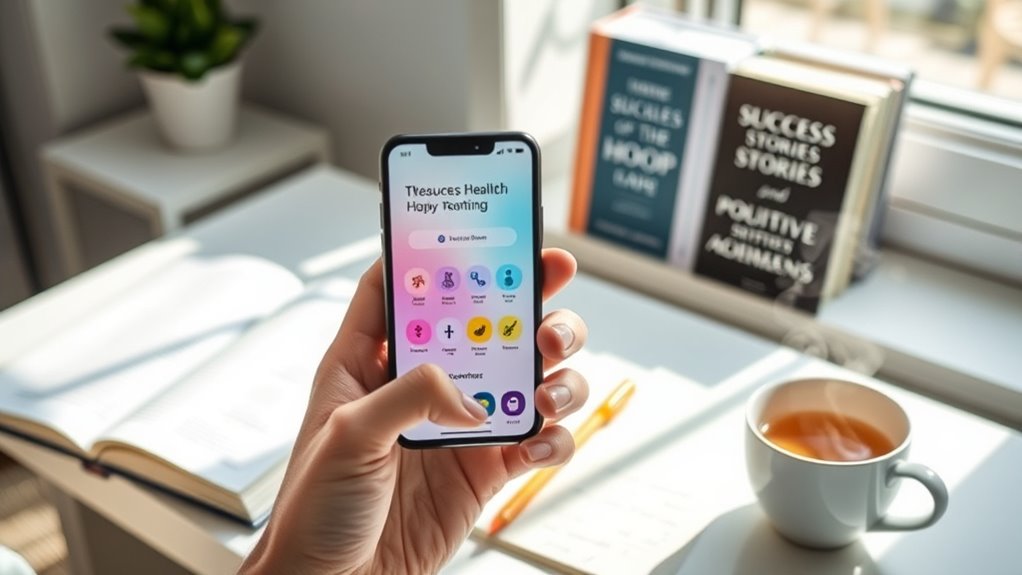
Countless users have found meaningful support through mental health apps, sharing stories of improved well-being and greater resilience. Peer testimonials highlight how these tools fit into daily routines, offering accessible help anytime. Success case studies reveal tangible progress, like overcoming anxiety or managing depression. Here are some ways users have benefited:
Many users find lasting support and progress through mental health apps.
- They report reduced stress levels after consistent app use.
- Many share that guided exercises helped build healthier habits.
- Users often find emotional support through community features and peer interactions.
These real-life experiences demonstrate that mental health apps can deliver effective support when used correctly. Their success stories inspire others to give these tools a try, showing that positive change is possible with dedication and the right resources.
Future Trends in Mental Health App Development
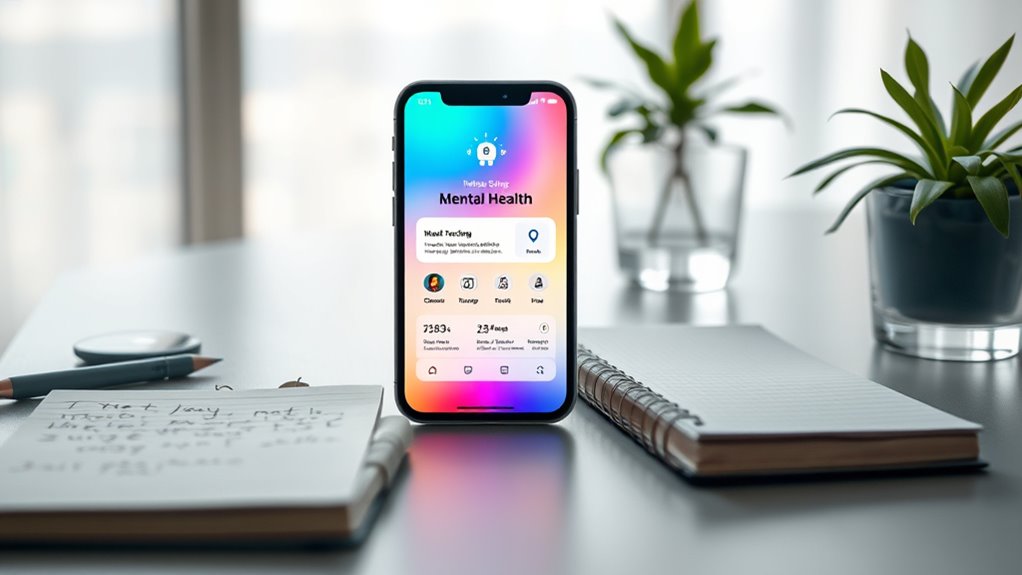
As technology continues to advance, the future of mental health apps is poised to become more personalized, integrated, and user-centric. Developers will leverage AI to tailor interventions based on individual needs, improving effectiveness. However, AI ethics will be central, ensuring data privacy, transparency, and fairness. You can expect apps to incorporate more real-time feedback and adaptive features that boost user engagement, making mental health support more accessible and appealing. Integration with wearable devices and other health platforms will provide holistic care, encouraging ongoing use. As these trends evolve, your experience with mental health apps will become increasingly seamless, secure, and customized, helping you stay motivated and engaged in your mental wellness journey.
Frequently Asked Questions
How Do Mental Health Apps Compare to Traditional Therapy?
You might wonder how mental health apps compare to traditional therapy. While apps offer convenience and can boost user engagement, their therapeutic effectiveness varies. They often provide helpful tools and immediate support, but may lack the personalized guidance a therapist offers. If you’re seeking ongoing, tailored treatment, therapy might be more effective. However, for supplemental support and increased engagement, mental health apps can be a valuable, accessible option.
Are Mental Health Apps Suitable for Severe Mental Health Conditions?
You might wonder if mental health apps suit severe conditions. They often have severity limitations, meaning they’re best for mild to moderate issues. If you’re experiencing a crisis or emergency support is needed, these apps aren’t enough and you should seek immediate professional help. While helpful for ongoing management, they can’t replace therapy or emergency care for serious mental health concerns. Always prioritize emergency services when needed.
What Are the Costs Associated With Using Mental Health Apps?
Like Pandora’s box, mental health apps come with costs. You’ll often face subscription fees, which vary depending on features and providers. While some apps are free, premium options might charge monthly or yearly. Be mindful of privacy concerns, as your data could be shared or sold. Always read the terms before committing, so you know exactly what you’re paying for and how your information is protected.
How Can I Ensure My Data Privacy When Using These Apps?
To guarantee your data privacy when using mental health apps, start by reading their privacy policies carefully. Look for apps that use data encryption to protect your information. Avoid apps that share data without clear consent. You can also restrict app permissions and use device security features. Staying informed about how your data is handled helps you maintain control and keeps your sensitive information secure.
Can Mental Health Apps Replace Professional Mental Health Support?
You might wonder if mental health apps can replace professional support. While they offer valuable self-help tools and can boost self help efficacy, they can’t fully substitute personalized care from therapists. To get the most out of these apps, use engagement strategies like setting reminders and tracking progress. Remember, they’re best as complementary resources, not replacements, for professional mental health support when needed.
Conclusion
While mental health apps can be helpful, they’re not a magic fix. They work best when you use them as part of a broader support system, like therapy or talking with friends. Don’t expect instant results—consistency matters. If you’re skeptical, try a free app first. Remember, these tools are there to assist, not replace, your mental health journey. With the right approach, they can be a valuable addition to your well-being.

